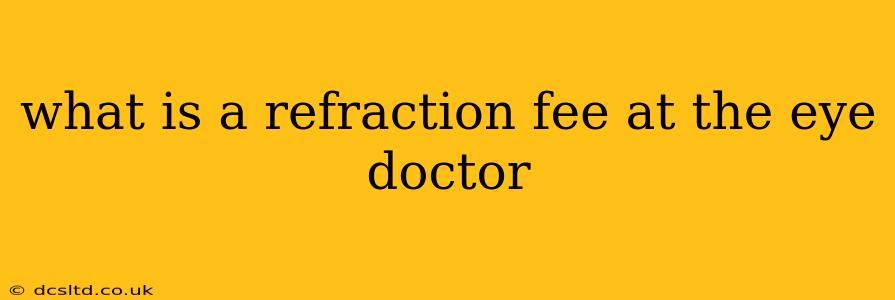A refraction fee at the eye doctor covers the cost of the eye exam portion specifically focused on determining your refractive error. This is the crucial part of the exam that measures your vision's clarity and helps determine the prescription needed for corrective lenses like eyeglasses or contact lenses. It's not the entire eye exam, but a significant component. Let's break down what this entails and answer some common questions.
What exactly is a refraction?
A refraction is the process your eye doctor uses to measure your refractive error. This is how much your eye bends (refracts) light. If light isn't bent correctly as it enters your eye, your vision becomes blurry. Refractive errors include:
- Myopia (Nearsightedness): You can see close objects clearly, but distant objects are blurry.
- Hyperopia (Farsightedness): You can see distant objects clearly, but close objects are blurry.
- Astigmatism: Blurry vision at all distances due to an irregularly shaped cornea.
During the refraction, your doctor uses various tools, including a phoropter (the device with many lenses) and retinoscope, to carefully measure your vision in different conditions. They'll ask you to read an eye chart and indicate which lenses provide the clearest vision. The results of this process determine the numbers in your eyeglass or contact lens prescription (sphere, cylinder, and axis).
Why is there a separate refraction fee?
Many eye doctors charge a separate refraction fee because it's a specialized procedure requiring expertise and time. It involves detailed testing and adjustments to find the optimal prescription. Some practices may bundle the refraction into a comprehensive eye exam fee, but others separate it. This allows for transparency in pricing. The fee covers:
- The doctor's time and expertise: Accurately determining your refractive error requires skill and experience.
- The use of specialized equipment: The phoropter, retinoscope, and other instruments involved aren't inexpensive to acquire and maintain.
Does insurance cover refraction fees?
Whether your insurance covers a refraction fee depends on your specific plan. Some plans cover routine eye exams, including refractions, while others may require co-pays or deductibles. Always check your insurance policy details or contact your provider to understand your coverage.
What’s the difference between a refraction and a comprehensive eye exam?
A refraction focuses solely on determining your refractive error and prescription for glasses or contacts. A comprehensive eye exam is broader. It includes the refraction but also assesses your overall eye health, checking for diseases like glaucoma, cataracts, and macular degeneration. It's a more extensive evaluation of your visual system. A comprehensive exam generally costs more than just a refraction.
How much does a refraction usually cost?
The cost of a refraction varies considerably depending on your location, the practice's pricing structure, and whether your insurance contributes. It could range from a small copay to several hundred dollars if you have limited or no coverage. Contacting your eye doctor directly is the best way to get a price quote.
Can I just get a refraction without a full eye exam?
While some practices might offer a refraction alone, it's generally recommended to have a comprehensive eye exam at least annually, especially as you age. A full eye exam detects potential eye health problems that a refraction alone won't catch. Early detection of eye diseases is crucial for preserving your vision.
In summary, the refraction fee covers the specialized service of determining your eyeglass or contact lens prescription. While you might find it listed separately, understanding its importance in maintaining good vision is key. Remember to always check your insurance coverage and discuss any questions about pricing with your eye care professional.
